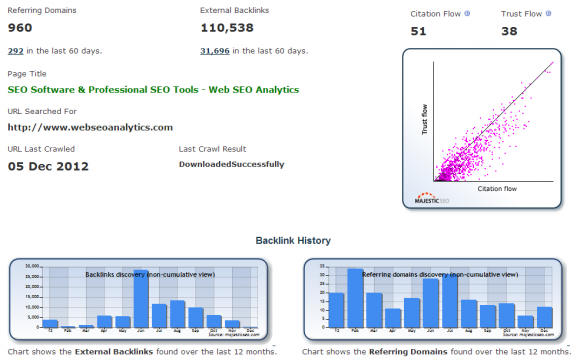The Importance of Backlinks in 2013: An Interview with Dixon Jones
![]() This is an interview with Dixon Jones. Dixon is the Marketing Director of MajesticSEO and a founding Director of Receptional, a leading UK Internet Marketing Consultancy. Dixon has been involved in running businesses since 1988 and has been involved in running and marketing online businesses since 1997. Follow Dixon on Twitter
This is an interview with Dixon Jones. Dixon is the Marketing Director of MajesticSEO and a founding Director of Receptional, a leading UK Internet Marketing Consultancy. Dixon has been involved in running businesses since 1988 and has been involved in running and marketing online businesses since 1997. Follow Dixon on Twitter

Today we have with us Dixon Jones. Dixon is the Marketing Director at MajesticSEO and the Founding Director of Receptional LTD. The topic of this interview is revolved around the future of backlinks, effective link building methods, high quality backlinks and interesting new features coming up from Majestic SEO.
1. For several years, backlinks were the dominant factor in SEO. The last few years, search engines started to incorporate in their Ranking Algorithms other signals such as Social Media Popularity, User Behavior, Location and Freshness. Based on your experience, how important are the backlinks and how much do they affect the Rankings in 2013?
For me, a mention from a person on Twitter is EXACTLY the same meaning as a link. If the Twitter user is a robot, or spam, that nobody will listen or care, just like a link on a computer generated low quality web page. So yes – social signals count… but they are still links. I have always said that a “link” is a web based word for “relationship”.
2. What are your views concerning the importance of relevant anchor text in SEO? Do you agree with Rand Fishkin’s prediction that it will be replaced by Co-Occurrence?
I think that we (as SEOs) got a little too fixated on anchor text back in the days when we could pull this data from search engines and it has taken until Penguin for us to see that we were concentrating too much on this signal. I think a little bit of anchor text is still a good thing… just enough to give context. After that, you need several (but not hundreds) of respectable web pages citing your web page. The rest is crap.
3. Attracting high quality links was always one of the most difficult tasks in SEO. Avoiding toxic links is also very important after the Panda & Penguin Updates. What according to your opinion are the most effective Link Building methods? How competitor & backlink analysis can improve the link building efforts?
I disagree that attracting high quality links is one of the hardest tasks. I believe the HARDEST task is building up a good reputation for innovation or for thought leadership or for downright integrity. If you cannot get people saying good things about you in the bars and offices then you will also not attract good links. The problem for many SEOs is that they do not have the social skills to have a conversation in a bar or an office! So they need to pair up with people with stronger social skills and realize that a good link starts with mutual respect.
4. Link Baits and Guest Blogging are considered two of the most effective ways to attract high quality backlinks. Can you confirm this based on Majestic SEO’s index and on the metrics/ranks that you have developed to measure link quality?
Here’s what I can confirm. When Majestic has a big announcement, we tell 10-20 influential bloggers. People like State of Search, Search Engine Journal. They can either publish the news or not – that’s their choice as there is no financial inducement to do so. However – when they DO publish, we tend to get more traffic (from them and from Search engines) and when they don’t – it is USUALLY because we gave them something that they thought was not interesting. What we do try to do is avoid giving the information to the influential people at the same time as spamming it across blogs and forums. If we were to do press releases to large networks instead of named individuals, then most likely Google would not see the message as coming from authority sites. Even worse (MUCH WORSE) the influential bloggers would see that they just reported a story which was already live on low quality sites. They will only do that once… then you are on borrowed time. So Link Bait and Guest Blogging indeed still works – but the quality of the blog and its content FOCUS is very important. I see many low quality blogs which seem to talk about clothing in one post and Virtual hosting in the next. That is unlikely to be a focused blog and at this point in time, none of the link providers give CONTEXT to the sites – although there is increasing context surrounding the link itself. Consider this… what if a search engine categorized every site based on the most prominent keywords. The site has a fixed amount of juice (say from 0-100) Now if a site worth 10 points talks about 2 things religiously, then each page in context will be worth more than a site worth 100 that talks about 100 things. Because data is not yet visualized in context especially well (although anchor text spread helps), we miss the obvious.

5. One of the most interesting features that MajesticSEO released back in summer was the Keyword Checker which gave us the ability to find how many pages use a specific phrase in the Anchor Text, Title, URL or domain. How can SEOs use this information and benefit from it while designing their SEO Campaigns/Strategies?
One great way is to use this as a way to compare whether a keyword is better tracked down through organic means or through PPC means. The Google Keyword Tool gives (poor) information about how competitive a phrase is on PAID channels – and SEOs have (to date) been using this data as a proxy for organic keyword analysis. But in practice, there are differences between what people wrote about on the web and what people type into search engines.
6. 2012 was a busy year for Majestic SEO. Can you briefly talk about the new features that you introduced and perhaps give us insights on what is coming next?
Wow – now I look back at it, we were pretty busy last year weren’t we? Looking back at it, I am amazed that Flow Metrics were only launched in May or so:
So after launching Flow Metrics in May, which gave us by far the most solid metrics for evaluating a URL’s importance on the fly, we were able to dramatically increase the size of our Fresh index in June. This is a process that we may get back to in 2013 if needed. We were also able to start getting our data into smaller development tools through our OpenApps technology which meant that developers did not have to spend large amounts on our API if they were prepared to let their users have direct accounts with Majestic. This culminated in the Chrome Backlink Analyzer Extension, a GoogleDocs spreadsheet and integration into SEOGadget’s spreadsheets and we hope other developers will create new apps using this technology in 2013.
As you point out, we launched a global anchor text checker in July and then we were able to show you anchor text by site in the site explorer later in the year. August saw the launch of tracking reports. These are still underused – which is a shame because they are free for subscribers. They track the Flow Metrics of any URL over time, but you need to set the report running to keep track, as we do not want to record historical flow metrics data for 4 trillion URLS when our customers only care about a tiny fraction of these. The biggie, though, was the ability to show new and lost links day by day, straight into the Site Explorer. We wanted our users to come to our site regularly – not just once a month. Looking at the new/lost links chart gives people a reason to do that. Then – in December – we also launched “Bucketlists”. These are great for link research… whenever you are looking for good (or bad) links, you can add ones that interest you to a backlist, for later analysis or to pass to another member of the team to contact. So plenty of development… I am sure I missed lots… and I think we will try and build on most of those innovations in 2013 if we can keep up the momentum.
I would encourage users to use the feedback button now on every page on the site (except the homepage) if they see anything that we should be doing better. We are compiling this feedback and using it to help direct our efforts.
Dixon.

 No Comments
No Comments


